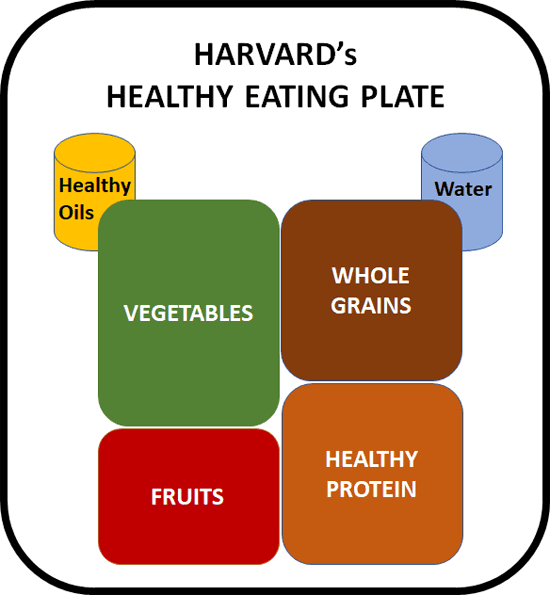I just finished reading an article1 about Dr. Frank Hu, professor of nutrition and epidemiology at the Harvard T.H. Chan School of Public Health. He and his colleagues created the following Healthy Eating Plate based on the best available scientific evidence:
Vegetables: Eat lots of them – the greater the variety the better. Potatoes, French fries, and tater tots don’t count.
Fruits: Eat plenty of fruits of all colors.
Whole Grains: Eat a variety of whole grains; limit refined grains (e.g., white rice, white bread).
Healthy Protein: Choose fish, poultry, beans, and nuts; limit red meat and cheese. Avoid bacon, cold cuts, and processed meats.
Water: Drink water, tea, of coffee with little to no sugar. Limit milk/dairy and juice. Avoid sugary drinks.
Healthy Oils: Use modest amounts of olive oil or canola oil for cooking and in salads, as needed. Limit butter. Avoid trans fats.
Unlike the U.S. Government’s Eating Plat, the Harvard version does not have a specific provision for dairy, and it places far greater emphasis on vegetables.
Dr. Hu and his colleagues are as concerned about our health as they are the health of the planet (which are, of course, inexorably intertwined). According to the article, food production accounts for 80% of deforestation, 70% of fresh water use, and 30% of human-generated greenhouse gas (GHG) emissions. Meat and dairy production account for 80% of the food industry’s GHG. Moreover, it takes 11 times more fossil fuels to produce a single unit of animal protein than it takes to produce a comparable amount of grain-based protein.
If eating meat were deemed healthy, there’d be a painful trade-off between bolstering human health and bearing the environmental cost. But it turns out that meat isn’t that healthy. Findings from the 2012 Health Professionals Follow-Up Study and Nurses’ Health Study revealed that increasing one’s consumption of meat by a single serving per day elevates morbidity risk by 13-20%.
Hu has published several papers on plant-based diets but claims that it does not have to be vegan or vegetarian. As I’ve read elsewhere, meat as a condiment instead of prominent occupant of the plate seems to be alright (though processed meats are not good!)
Hu and his colleagues face an uphill battle in gaining governmental traction on their recommendations. Powerful political and commercial interests stand in their way. And, to be sure, there are still randomized, double-blind studies to be done to solidify their research. But as Hu says: “Globally, if we always just wait for the absolute proof or conclusive evidence, then it’s going to be disastrous. It’s going to be too late for both human health and the environment.”
1 See Diet Science: Healthy Humans, Healthy Planet by Jacob Sweet in Harvard Magazine, March-April 2020
